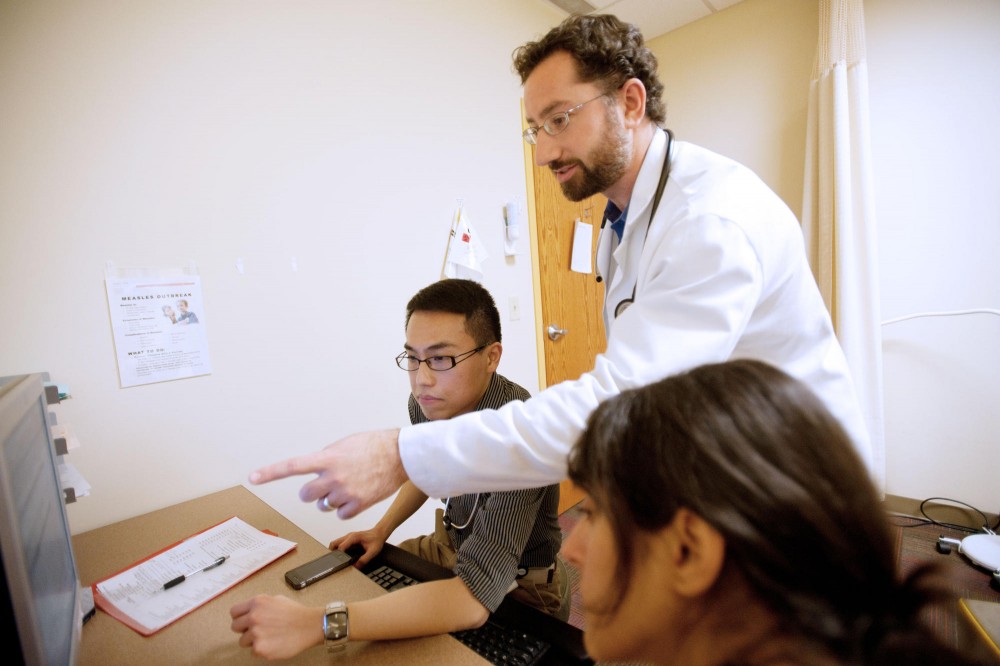When Dr. Kathryn Curdue applied to medical school at the University of Minnesota 30 years ago, she and all the other applicants had to take a personality test.
The test is long gone, but the idea that bedside manner can be just as important as book knowledge has prompted medical schools and hospitals to seek new forms of screening applicants.
âÄúItâÄôs very difficult to assess a studentâÄôs bedside manner as theyâÄôre applying for medical school,âÄù said Dr. Patty Dickmann, a second-year resident in psychiatry at the University who has worked with the admissions committee.
At the University, studentsâÄô interpersonal skills are evaluated during a one-hour long interview âÄî perhaps not long enough to gauge someoneâÄôs personality, Dickmann said.
The University has made some admissions and curriculum changes in recent years to make sure students learn people skills as well as technical aptitude, but the school is satisfied with the current process, said Dr. Kathleen Watson, associate dean for students in the Medical School.
Some medical schools across the country have started to expand on the traditional interview with an assessment called the Multiple Mini-Interview.
In the MMI, small groups of applicants do timed activities at six to 10 stations. They could face an ethical dilemma, interact with an actor or perform a task requiring teamwork. Admissions offices hope the process will reveal the important qualities of a physician, or lack thereof, that arenâÄôt obvious in a written application or during a one-on-one interview.
Watson said the personnel needed to pull off the MMI isnâÄôt practical at the University, especially when its current system is working well.
But students and doctors agreed that itâÄôs difficult to know how genuinely empathetic and caring a student is in a one-hour interview.
Evaluators risk not getting âÄúthe whole pictureâÄù because they donâÄôt get to be around the students in a natural clinical environment, said Phillip Radke, president of the Medical School Student Council.
In the Department of Surgery, doctors and residents have a name for book-smart students who have no social skills: âÄú4.0 robots,âÄù said student worker Ashley Erichsen.
Erichsen helps the department go through resident applications, which come from around the country and said the term isnâÄôt specific to the University.
Watson said the first two years of medical schoolâÄôs curriculum, which precede clinical rotations, now emphasize patient-centered communication.
In the first two weeks of Essentials of Clinical Medicine âÄî one of the first-year introductory courses at the school âÄî medical students read aloud from writings by people who have had illnesses, role playing the patient. After theyâÄôve learned how to conduct a patient interview, the school brings in people for them to practice with, who give feedback on the doctor-patient connection.
âÄúBut itâÄôs hard to teach people to care,âÄù Radke said. âÄúYou have to have that aspect as well within you.âÄù
When it comes time for medical students to apply for residency, technical knowledge and skills are only half of what the programs look for, said Dr. David Satin, an assistant professor and adviser at the Medical School.
Bedside manner is the other important piece they look for, Satin said, but there arenâÄôt as many tests for it.
As an adviser, Satin helps prepare medical studentsâÄô performance evaluations, which include comments from doctors about studentsâÄô clinical rotations. The comments often speak to bedside manner, Satin said, but aside from that, there are few measures of interpersonal skills available to the hospitals and medical practices that are looking to hire recent graduates.
In 2007, admissions criteria shifted to pull in more students from outside the health sciences, said Watson.
Pulling in students with diverse academic and life backgrounds helps ensure that doctors coming from the University are well-rounded, not simply Type A, said Dickmann, president of the class of 2010.
Working at the MacyâÄôs candy counter was âÄúincredibly helpfulâÄù in preparing Dickmann for medical school, for example. Doing customer service and managing client conflicts carried over into her practice as a physician, she said.


